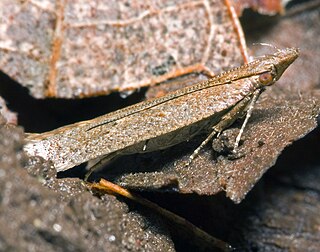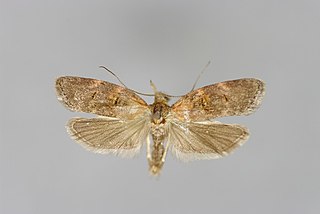
The Gelechiidae are a family of moths commonly referred to as twirler moths or gelechiid moths. They are the namesake family of the huge and little-studied superfamily Gelechioidea, and the family's taxonomy has been subject to considerable dispute. These are generally very small moths with narrow, fringed wings. The larvae of most species feed internally on various parts of their host plants, sometimes causing galls. Douglas-fir (Pseudotsuga) is a host plant common to many species of the family, particularly of the genus Chionodes, which as a result is more diverse in North America than usual for Gelechioidea.

Scythrididae is a family of small moths in the superfamily Gelechioidea. The family is sometimes included in the Xyloryctidae as a subfamily Scythridinae, but the Xyloryctidae themselves have sometimes been included in the Oecophoridae as subfamily. Scythrididae adults are smallish to mid-sized moths, which when at rest appear teardrop-shaped.

The Pyralinae are the typical subfamily of snout moths and occur essentially worldwide, in some cases aided by involuntary introduction by humans. They are rather rare in the Americas however, and their diversity in the Australian region is also limited. Altogether, this subfamily includes about 900 described species, but new ones continue to be discovered. Like many of their relatives in the superfamily Pyraloidea, the caterpillar larvae of many Pyralinae – and in some cases even the adults – have evolved the ability to use unusual foods for nutrition; a few of these can become harmful to humans as pests of stored goods.

Udea is a genus of snout moths in the subfamily Spilomelinae of the family Crambidae. The genus was erected by Achille Guenée in 1845. The currently known 216 species are present on all continents except Antarctica. About 41 species are native to Hawaii.

Ectropis is a genus in the geometer moth family (Geometridae). They are mostly paleotropical, but also plentiful in Australia and extend into Asia. Only one species – or cryptic species complex – is found in Europe. There are about 100 known species in this genus.

Ancylis is a genus of moths belonging to the subfamily Olethreutinae of the family Tortricidae.

Spilonota is a worldwide genus of moths belonging to the subfamily Olethreutinae of the family Tortricidae.

Acleris is a genus of moths belonging to the subfamily Tortricinae of the family Tortricidae. As of 2007, about 241 species were known.

The Depressariinae – sometimes spelled "Depressiinae" in error – are a subfamily of moths in the superfamily Gelechioidea. Like their relatives therein, their exact relationships are not yet very well resolved. It has been considered part of family Elachistidae sensu lato or included in an expanded Oecophoridae. In modern classifications they are treated as the distinct gelechioid family Depressariidae.

The Oecophorinae are the nominate subfamily of moths in the concealer moth family (Oecophoridae). They are part of the insufficiently studied superfamily Gelechioidea, and like their relatives, the circumscription of this taxon is disputed.

Pseudatemelia is a genus of gelechioid moths.

Adela is a genus of the fairy longhorn moth family (Adelidae). Among these, it belongs to subfamily Adelinae.

Agonopterix is a moth genus of the superfamily Gelechioidea. It is placed in the family Depressariidae, which was often – particularly in older treatments – considered a subfamily of the Oecophoridae or included in the Elachistidae.

Mompha is a genus of moths in the family Momphidae that was first described by Jacob Hübner in 1819. It has four subgenera.

Semioscopis is a moth genus of the superfamily Gelechioidea. It is placed in the subfamily Depressariinae.

Anchinia is a genus of gelechioid moths.

Xyloryctidae is a family of moths contained within the superfamily Gelechioidea described by Edward Meyrick in 1890. Most genera are found in the Indo-Australian region. While many of these moths are tiny, some members of the family grow to a wingspan of up to 66 mm, making them giants among the micromoths.

















